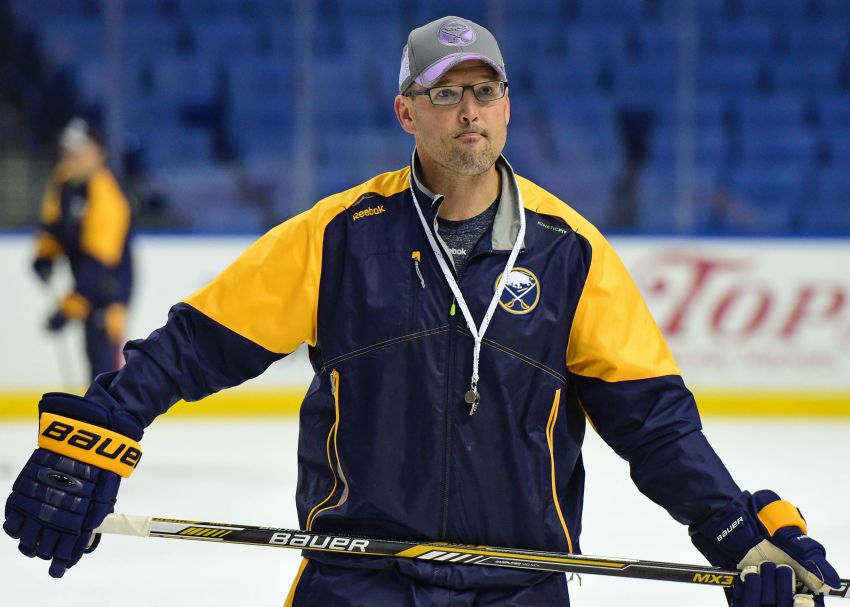TORONTO – This is all a new experience for Buffalo Sabres coach Dan Bylsma, you know – the losing, the expectation the Stanley Cup will be won in the near future, not immediately.
Bylsma stormed into the NHL seven years ago, leading the Pittsburgh Penguins to a championship just months later. While Bylsma endured a string of playoff failures in the ensuing five seasons, he kept winning, reaching 200 victories faster than any coach in NHL history (316 games).
When the Sabres hired Bylsma in May, his .668 points percentage – 252-117-52 – ranked No. 1 among coaches with at least three seasons of experience.
Entering tonight’s tilt against the Maple Leafs, the Sabres have lost 40 of his first 66 games (26-31-9). Bylsma had never lost more than 35 times in a full season. He hasn’t missed the playoffs since he was a first-year assistant coach with the New York Islanders 10 years ago.
“It’s not something I’m real comfortable with,” Bylsma said about losing.
Bylsma, of course, understood resurrecting the Sabres following their deep rebuild could be an arduous task, especially early on. But Bylsma’s only human. The trying season has been difficult for the affable American to handle at times.
With wins suddenly harder to come by, Bylsma has started cherishing the triumphs more and more.
Following a tight road victory in November, a giddy Bylsma was seen pumping his fist leaving the bench. After a recent win, someone asking for a high-five got his hand slapped with unusual fervor by Bylsma.
“I probably have been, yes, more exuberant and more emotional, probably both ways – winning and losing,” Bylsma said Sunday inside the First Niagara Center. “It takes a toll on you not winning hockey games and not getting success.”
Throughout the struggles of 2015-16, Bylsma hasn’t flinched or wavered from the process he believes the Sabres must follow to morph into a contender, defenseman Josh Gorges said.
Each day, Sabres goalie Chad Johnson said, Bylsma has a fresh focus.
“He really brings a strong identity and culture to the team, which, being here last year, I think you saw it on the ice, there’s no real identity of the team,” he said. “This year, you can see we have a little bit more of an identity as much as maybe we’re struggling.”
That identity is formed in a lot of different ways. To Gorges, it starts with the structure Bylsma has instilled “all the way through” the team.
It’s “how you prepare for practice,” he said. “(The actual) practice. Knowing in any and every situation, what’s your job? Where you supposed to be? Where should the puck go? Where should your support be?
“The little, little details of a game. It’s not an easy thing to pick up, but I think we have and we still are progressing and getting better with all that stuff, which is making us a better team.”
Bylsma’s personality – he’s usually smiling and talks up anybody within earshot – rubs off on his team.
“Lot of energy,” Gorges said. “You can see that he has a passion for this game.”
The Sabres have improved in nearly every facet following consecutive 30th-place finishes.
Nonetheless, they’re still a bottom-feeder. They often play terribly at home (12-17-5), rank 26th overall and have scored the third-fewest goals.
On the bright side, they’re a strong road team (14-14-4), have shown they can execute a system well at times and have 21 one-goal losses, including Saturday’s 3-2 home shootout defeat to Minnesota.
Maybe, just maybe, the Sabres are closer to contending than it appears.
“I think you know you’re developing a process with your team and trying to build expectations to win and to win every night, and that’s a process we’ve been in from Day One,” Bylsma said. “That’s one we have to learn how to play the right way. We have to learn and develop that attitude in our team.”
The Cup ring Bylsma earned could help develop that attitude.
“I think when you’re a part of such a strong organization in Pittsburgh winning a Stanley Cup, there’s an experience that you have with what it takes, the group that you have and the pieces that you have there, how you have to play to get to that certain point of winning a Stanley Cup,” Gorges said.


